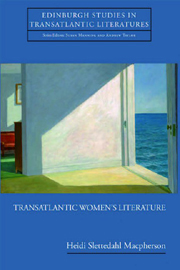Conclusion
Published online by Cambridge University Press: 12 September 2012
Summary
Karen Lawrence maintains that ‘the trope of travel – whether in its incarnations as exile or adventure, tourism or exploration – provides a particularly fertile imaginative field for narrative representations of women's historical and personal agency.’ As noted in the Introduction, it is precisely for this reason that women's narratives of transatlantic travel are such rich sources for explorations of identity and representation. Fictional travel narratives, like their factual counterparts, provide accounts of difference by exploring the politics of location while simultaneously examining localities. As cultural outsiders, travellers comment upon the society from which they spring and the societies to which they now belong (if, in some cases, only temporarily).
This book is one example of the way in which literary studies have been transformed by transnational critiques, which look beyond a single space or area to explore connections across and between such spaces, connections that are complicated, uneven and sometimes fraught. The dynamic interactions suggested by terms such as transatlanticity have been carefully explored within the novels and memoirs that feature in the preceding chapters. The transatlantic space is ‘perpetually in motion, perpetually assembling, disassembling, and reassembling itself’, and Transatlantic Studies necessarily engages with issues of flux and change. Transatlantic Studies must also, I argue, confront and grapple with issues of identity and gender.
What all of the travel narratives explored in Transatlantic Women's Literature have in common is a sense that gender is a condition which impinges upon – even determines – the travel experience.
- Type
- Chapter
- Information
- Transatlantic Women's Literature , pp. 174 - 181Publisher: Edinburgh University PressPrint publication year: 2008



